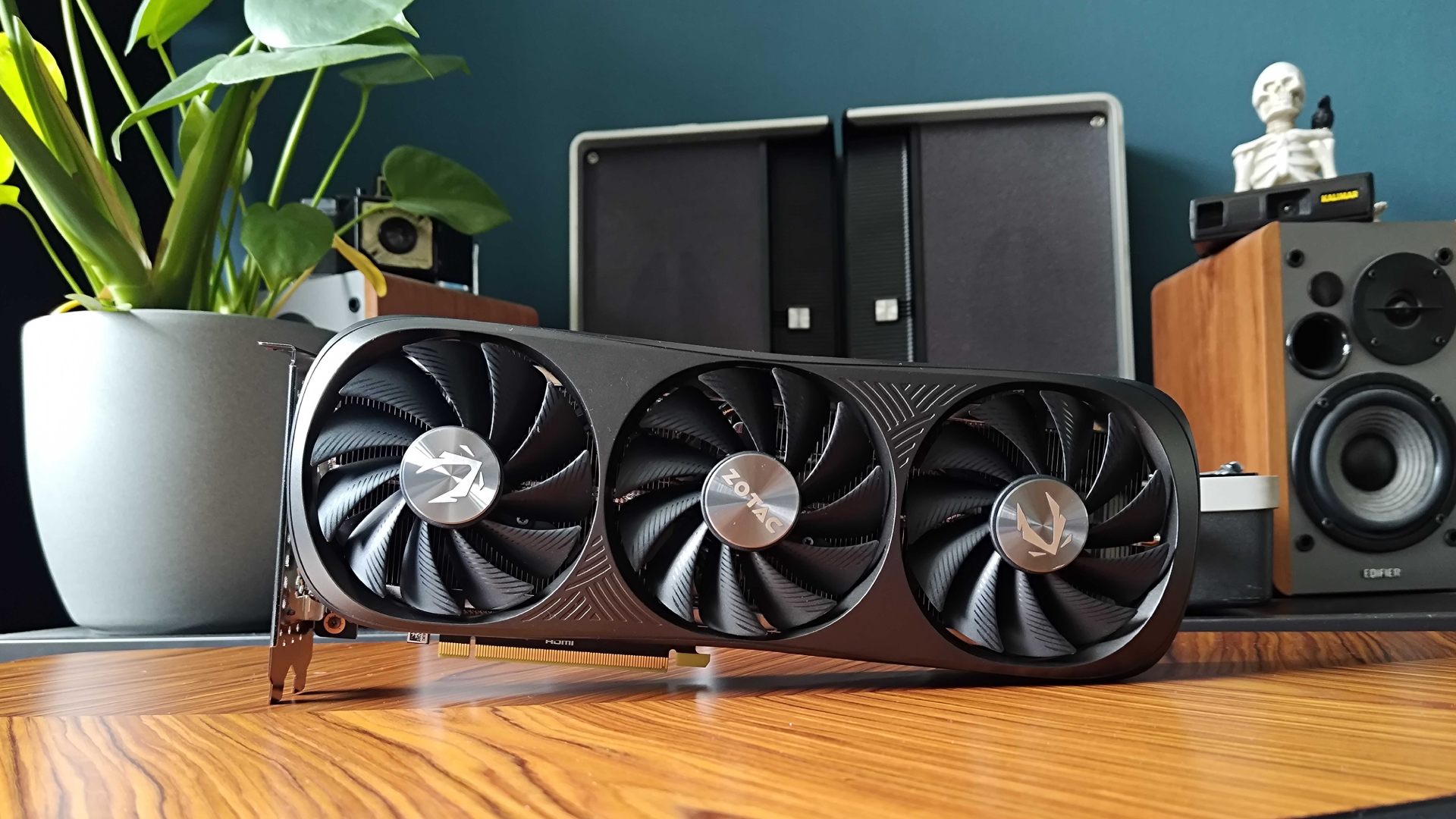GamesRadar+ Verdict
The Nvidia GeForce RTX 4070 Super is now arguably the best version of the mid-range GPU, providing great 1440p performance that improves upon the original Lovelace contender. It’s still only rocking 12GB GDDR6 memory and vanilla RTX 4070 price cuts could make this model a harder sell. However, the card’s higher CUDA core count does produce a respectable performance bump that makes it worth picking up.
Pros
- +
Improved specs over original
- +
Fantastic 1440p performance
- +
Decent 4K abilities
- +
DLSS bells and whistles
Cons
- -
Original keeps getting cheaper
- -
Still got 12GB VRAM
Why you can trust GamesRadar+
Upon firing the Nvidia GeForce RTX 4070 Super into my testing rig, I started having an internal argument over whether the mid-range graphics card even needed a revamp. I mean, the original is still fresh-faced, and the GPU giant is standing by its decision to arm it with 12GB VRAM. Despite that stubbornness, I reckon the souped-up model manages to provide enough of a performance bump to stand out, especially since it has the same MSRP attached to its forehead.
For context, the Nvidia GeForce RTX 4070 Super prices start at $599 / £579, matching the launch MSRP of the original version. For your money, you’re getting a best graphics card contender that packs more cores across the board, translating the level of mid-range performance I was craving back from last year’s release. Not that there was anything particularly offensive about the standard version, but I was hoping for a little more headroom at 1440p for the price.
Now that Nvidia has popped a cape on its middle-ground GPU, it’s far easier to recommend it to players prioritizing value. I could be persuaded to revisit the original if it drops further below its current readjusted price of $549 / £529, and it’d be silly not to keep an eye on it if you’re looking to save a few bucks. That said, the RTX 4070 Super hits a sweet spot that’s worth investing in, especially if you’d rather tweak fewer settings in some of the more gluttonous PC outings in your Steam library.
Specs
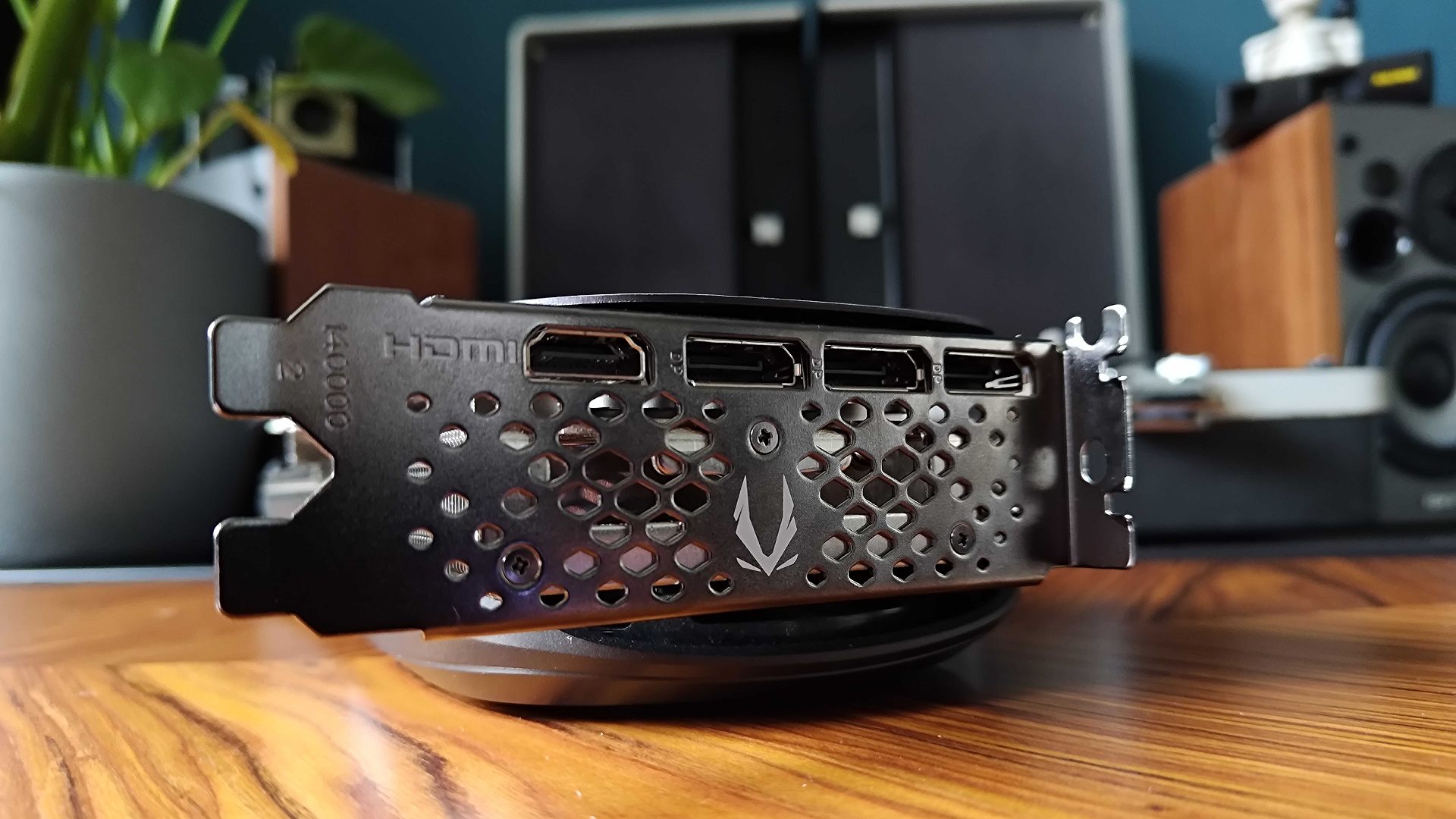
At face value, not much has changed in terms of specs, as we’re dealing with 12GB GDDR6X VRAM paired with an AD104 Lovelace GPU. But, if you’re willing to get nerdy and look into the new card’s chip, you’ll see it’s an AD104-250-A1 die, complete with 7,168 CUDA cores, 224 Tensor cores, and 56 dedicated to ray tracing. Comparatively, that’s a pretty big bump over last year’s version, as you’ll be able to see in the handy table below:
| Model | Founder's Edition | Zotac Trinity |
|---|---|---|
| Price | $599 / £579 | $649.99 / £619.98 |
| GPU | AD104 | AD104 |
| CUDA cores | 7,168 | 7,168 |
| Tensor cores | 224 | 224 |
| RT cores | 56 | 56 |
| Base clock | 1,980 MHz | 1,980 MHz |
| Boost clock | 2475 MHz | 2475 MHz |
| VRAM | 12GB GDDR6X | 12GB GDDR6X |
| Memory bus | 192 bit | 192 bit |
If Nvidia’s 16-pin 12VHPWR gives you the ick, you’re out of luck, as the RTX 4070 Super retains the new connector. Not exactly surprising, but it might deter anyone looking for a nice simple upgrade. Thankfully, the new standard doesn’t affect TDP, as since it boasts the same 220W draw as the last-gen RTX 3070, you likely won’t have to grab a new PSU to bring everything together.
As for ports, you'll have HDMI 2.1 and three DisplayPort 1.4 ports at your disposal, which should be more than enough to connect to screens without limitations.
Design
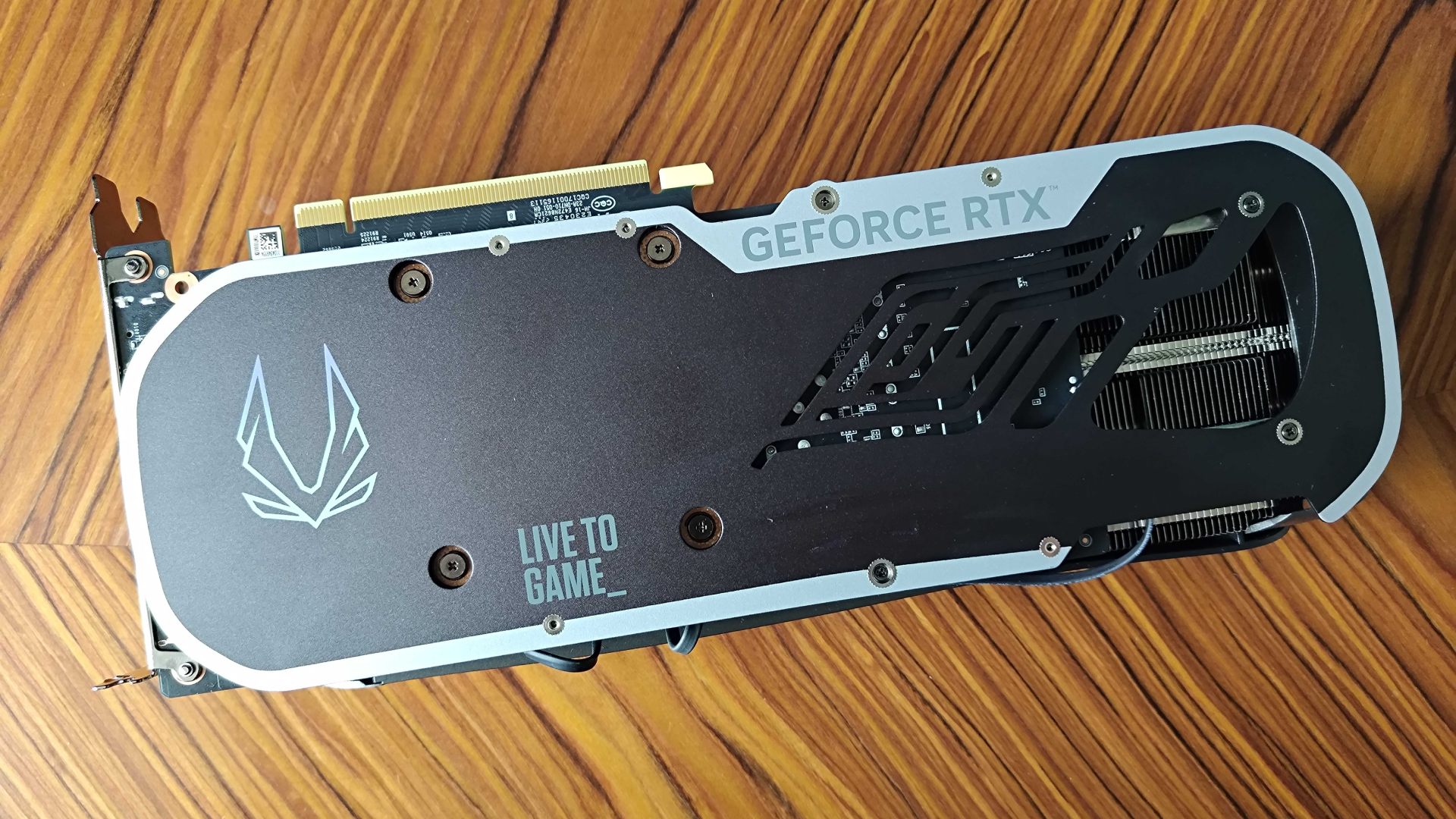
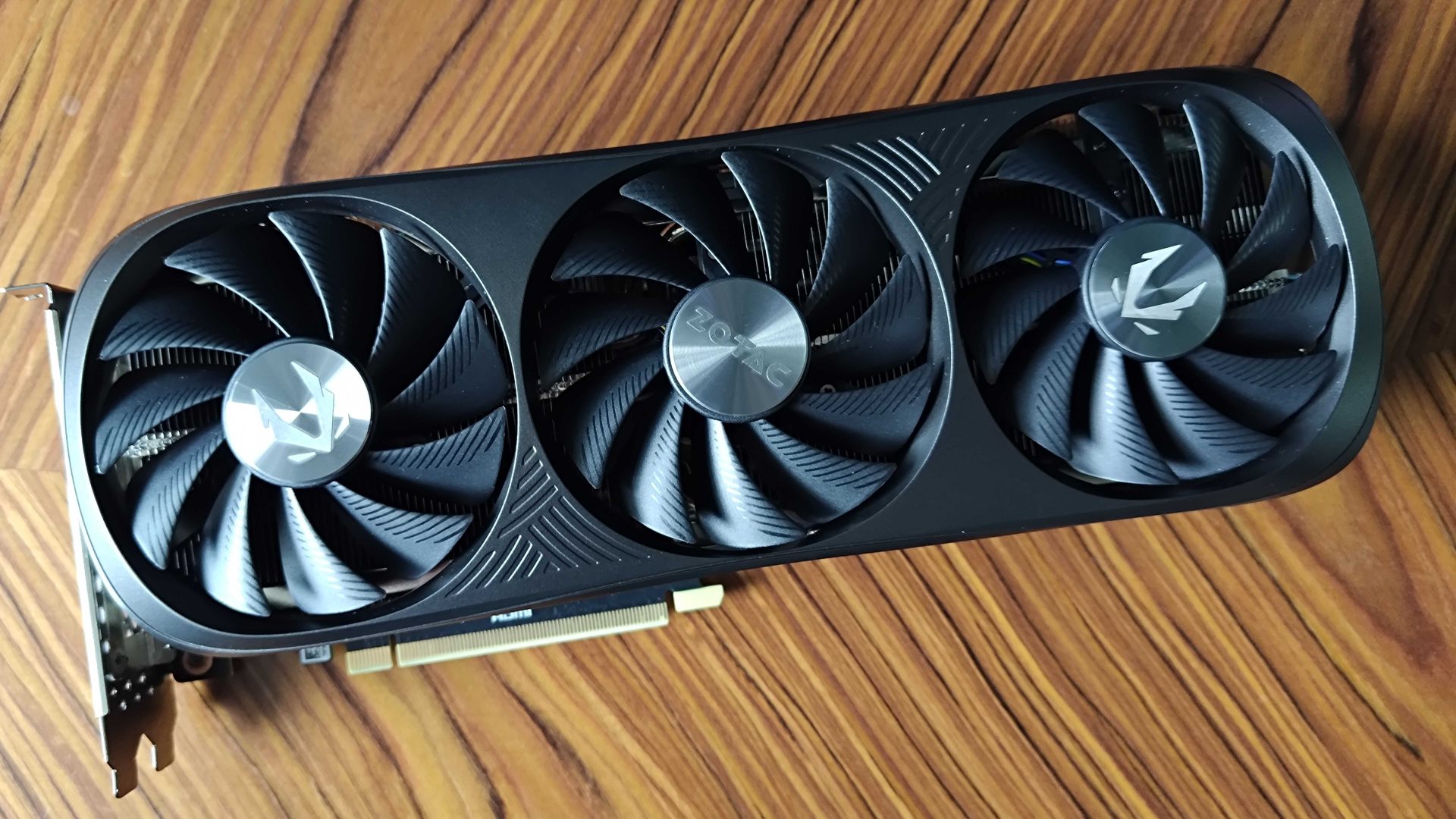
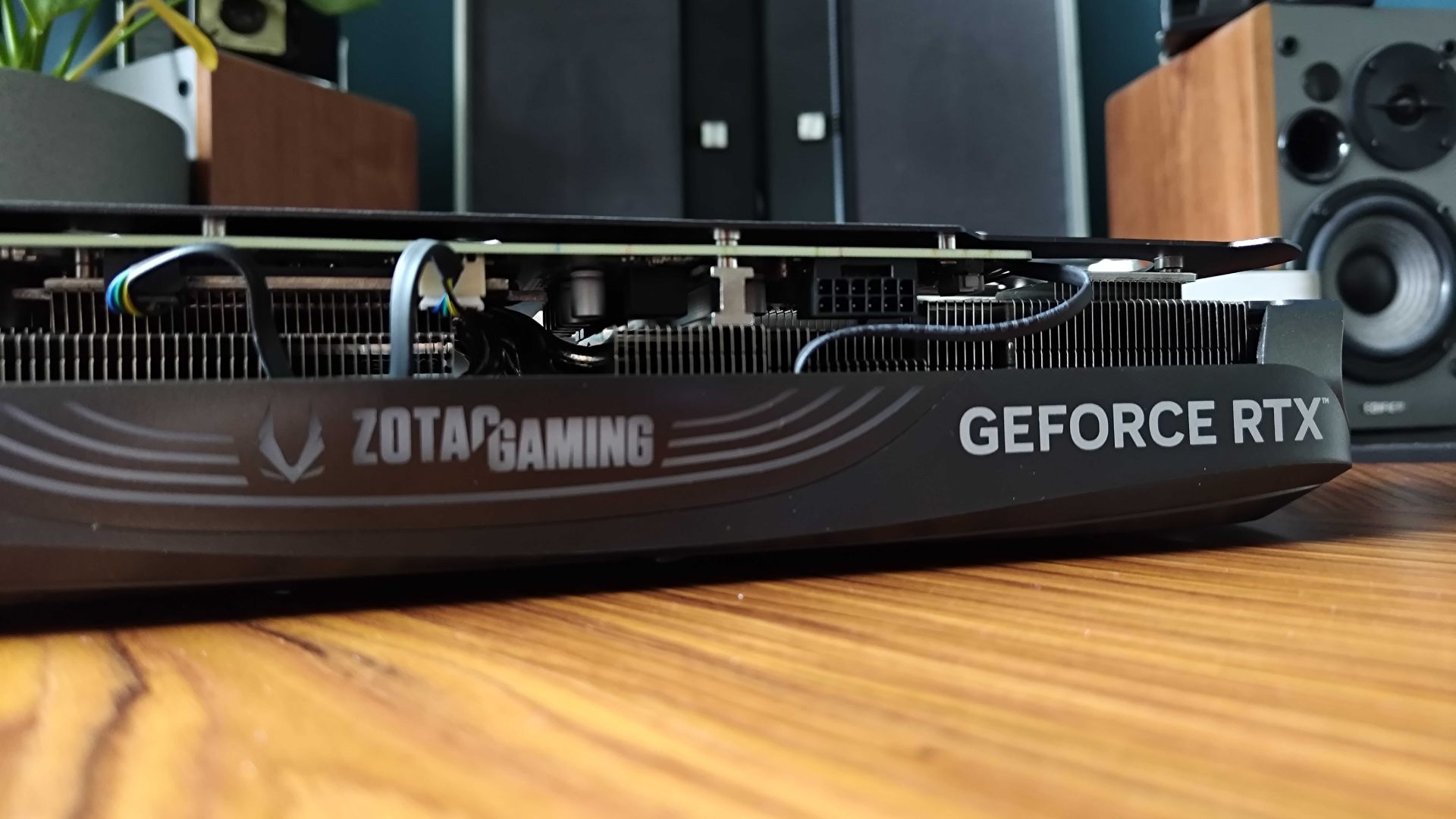
The specific card I’ve been testing for my first RTX 4070 Super review is the Zotac Trinity version, and oh boy is it a chonker. That’s simply because it uses the same shroud and triple fan configuration you’d expect to find on beefier cards like the Spider-Man RTX 4070 Ti. Naturally, all the extra cooling oomph this time around is going to benefit overclockers and those looking for icy temps most, but it could be a dealbreaker if your case layout is expecting a mid-range footprint.
The same applies to the card’s girth, as it takes up the same number of case slots as the RTX 4080 Super. Yes, that is ridiculous considering the class difference, and it’s weird seeing a mid-range GPU dominate the inside of my spacious PC case. I do not doubt that if I fancied it, I could likely push this card to perform well beyond its native capabilities thanks to the extra cooling, I’m just not too sure how many people will be buying this card to do just that.
As for looks, Zotac’s RTX 4070 Super retains that curvy vibe that I’ve come to love. It makes for a nice change from the angular, almost brutalist designs adopted by other brands, and it’s certainly much flashier than MSI’s vanilla RTX 4060. Not that I think the latter is inherently bad, as it’s supposed to be a minimalist space saver, but your eyes will appreciate fun extras like its RGB-lit logo.
Features
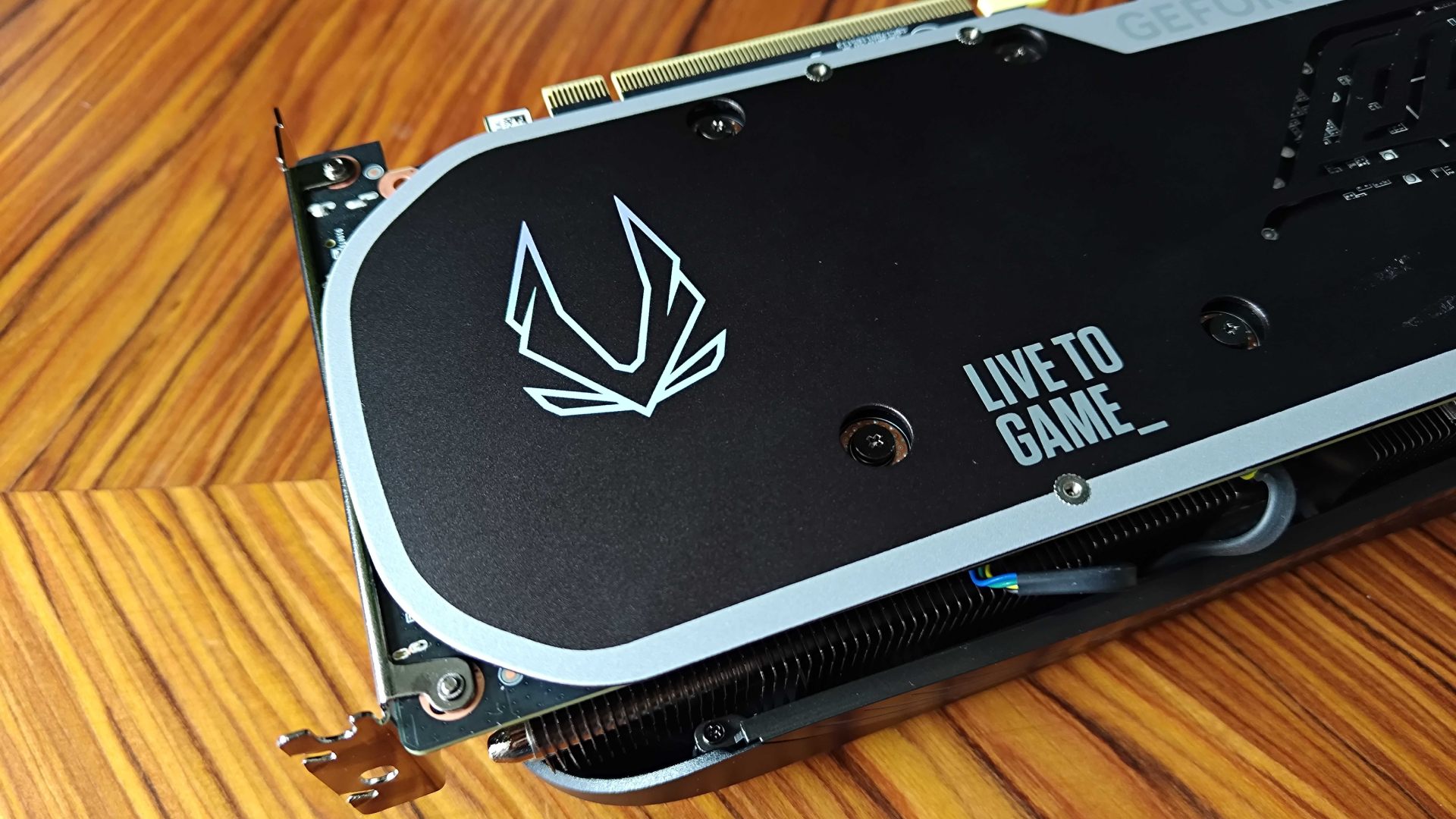
The Zotac RTX 4070 Super Trinity is compatible with the company’s own Firestorm GPU management kit, which grants access to an easy-to-use overclocking interface, fan speed parameters, and other handy dials. It’ll also let you mess around with the card’s RGB lighting, so downloading the app is essential if you care about the color selection inside your case.
On the Nvidia side of things, the RTX 4070 Super has access to the same arsenal as its RTX 4000 siblings. If you happen to own a compatible game, you’ll be able to take advantage of AI upscaling tricks like DLSS, with generational exclusive features like Frame Generation helping further boost fps with minimal caveats. If you’re into fancy lighting, you’ll also have Ray Reconstruction at your disposal to enhance ray-traced visuals using AI, while Nvidia Reflex will ensure that latency issues are kept at bay.
GeForce Experience is also worth talking about, as Nvidia’s driver software helps provide additional functionality. Sure, some of you will only ever launch it for updates, but it does boast other qualities like automatic game optimization and overlay tools for content capturing. It’s easy to take some of these provisions for granted, and if you haven’t upgraded your GPU in the past 10 years, some of the features included might feel quite novel.
Performance
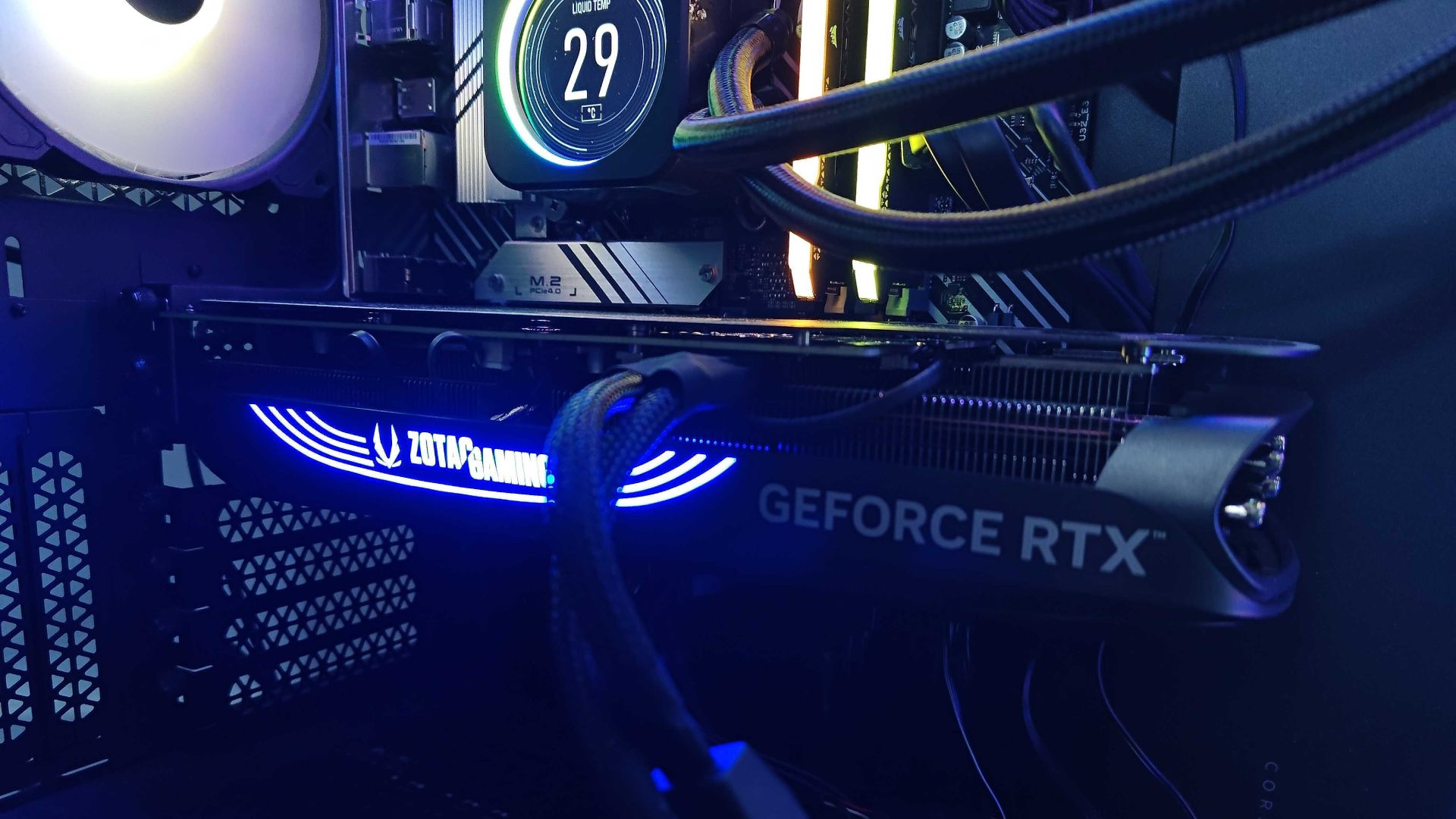
As you’d expect from a GPU that bears a heroic title, the RTX 4070 Super packs more of a punch than its predecessor. It’s got elevated specs to thank for that, but it’s well worth reiterating that it costs more as a result. Still, my benchmarks managed to impress me and make the overall investment feel worthwhile, provided the OG card doesn’t end up much cheaper.
Kicking things off as always with Cyberpunk 2077, and I was able to hit a respectable 87fps with all bells and whistles switched to ultra at 1440p. That figure more than halves when you crank things up to 4K, a dip that’s almost a certainty, but switching on DLSS and Frame Generation served as a swift remedy, driving everything back up to 102fps. These tests illustrate that if you want to stick to UHD, or even just satiate one of the best gaming monitors with a higher refresh rate, AI shenanigans will help you reach the bar.
| Game | 1440p | 4K |
| Cyberpunk 2077 | 87fps | 40fps |
| Hitman 3 | 140fps | 104fps |
| Shadow of the Tomb Raider | 120fps | 59fps |
| Total War: Warhammer 3 | 107fps | 55fps |
| Returnal | 104fps | 60fps |
Moving on to Hitman 3, the RTX 4070 Super pulls off some seriously slick moves. Native 1440p Ultra performance clocked in at 140fps, with everything sticking to that average with slick stability. Even switching to 4K didn’t prompt too much of a drop, as I was able to keep performance at about 104fps without relying on upscaling. Weirdly, switching on Nvidia’s collective of AI tools only ramped things up to 147fps – still great, but I’m used to seeing a more substantial jump.
Total War: Warhammer 3 is my way of taking off the training wheels during benchmarking, as the RTS romp is both demanding and features no upscaling support. Luckily, that failed to phase the RTX 4070 Super at 1440p, with the GPU pumping out a 107fps average during stress tests. It did break a sweat trying to deal with 4K, with that frame rate being kicked back down to 55fps, which isn’t something I’m remotely going to hold against the mid-range card.
Returnal has been my default demanding port for testing this generation, and the roguelike holds up well on the RTX 4070 Super. At 1440p, I was able to easily reach 104fps with settings at full throttle and managed to hit that 60fps sweet spot at 4K. I’d recommend using DLSS and Frame Generation if you’re hellbent on sticking with UHD, as that latter average was afflicted by dips in certain scenarios. Nevertheless, it’s very encouraging to see this sort of performance from what can be a problematic port on a mid-range GPU, even though it’s pulling harder visual punches than the PlayStation 5.
Should you buy the Nvidia GeForce RTX 4070 Super?
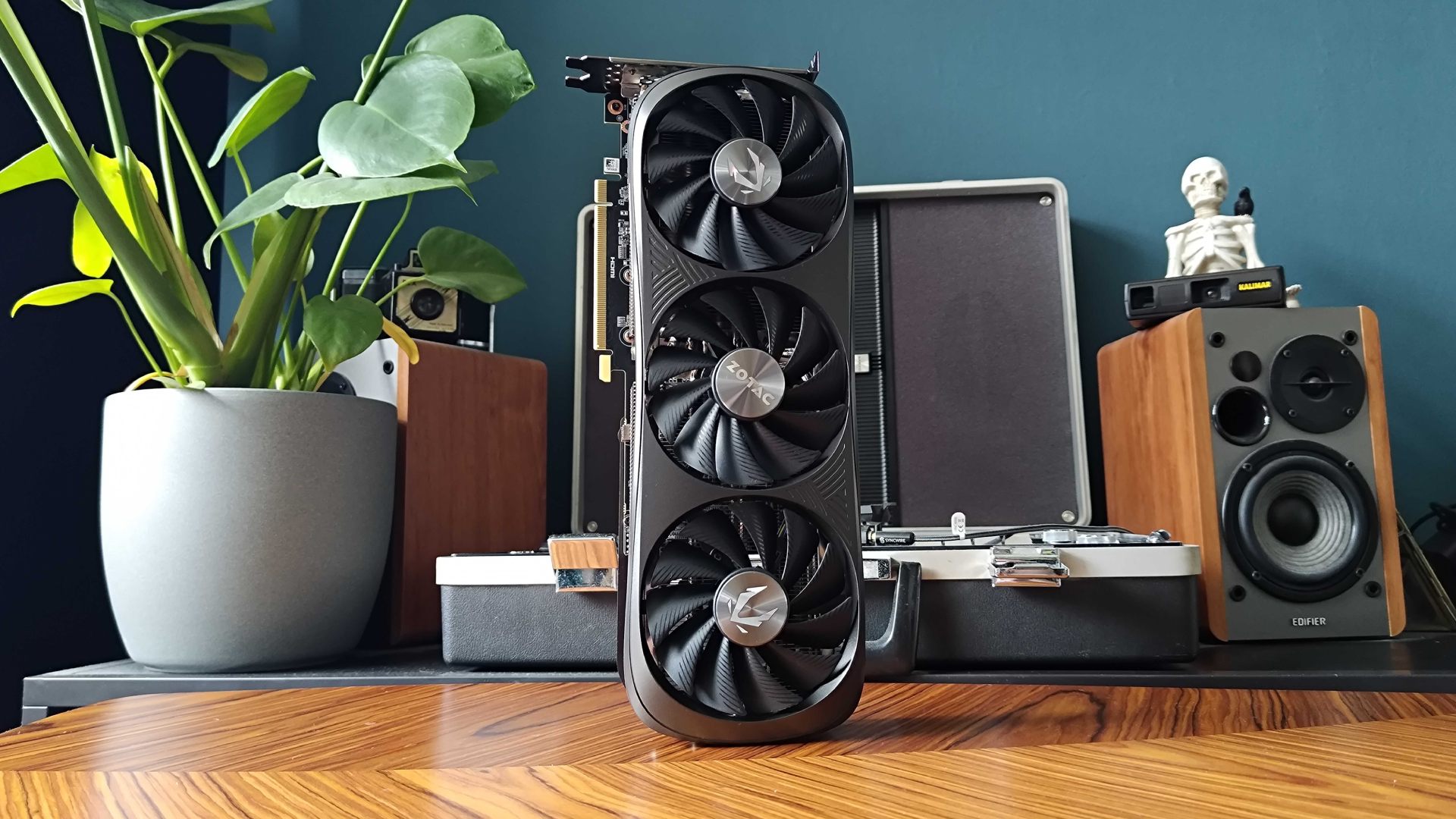
I have no doubts that the Nvidia GeForce RTX 4070 Super is one of the best GPUs out there right now for 1440p gameplay, and it even leaves some room for a proper 4K experience. That said, Nvidia’s decision to place it on the battlefield next to its vanilla sibling rather than outright replace it may serve as a buying dilemma, as lower pricing makes for an excellent distraction. Investing in the new model over the original is going to provide you with a noticeable performance hike, but it might be hard to appreciate if discounted non-Super variants start to pop up.
Of course, that’s if you’re gunning for the cheapest models around, as the Zotac RTX 4070 Super Trinity featured here retails for $649.99 / £619.98. As with all custom cards, the extra expense is tied to its more sophisticated cooler and design, which is worthwhile if you’re into overlocking. If you’re not fussed about temperatures or squeezing more performance out of your GPU, you’re better off sticking with one of the cheaper options out there, provided you can find one for near MSRP.
How I tested the Nvidia GeForce RTX 4070 Super
For two weeks, I used the RTX 4070 Super in my main PC for both playing games and everyday activities. During that time, I used a set list of titles, including Cyberpunk 2077, Hitman 3, Shadow of the Tomb Raider, Total War: Warhammer 3, and Returnal to benchmark the GPU and collate average frame rates.
For more information on how we test graphics cards and other components, swing by our GamesRadar+ hardware policy.
Looking for an entire rig? Check out the best gaming PC builds for a wide selection of systems. If you'd rather play on the go, take a peek at the best gaming handheld and best gaming laptop options for portable Steam machines.

I’ve been messing around with PCs, video game consoles, and tech since before I could speak. Don’t get me wrong, I kickstarted my relationship with technology by jamming a Hot Wheels double-decker bus into my parent’s VCR, but we all have to start somewhere. I even somehow managed to become a walking, talking buyer’s guide at my teenage supermarket job, which helped me accept my career fate. So, rather than try to realise my musician dreams, or see out my University degree, I started running my own retro pop culture site and writing about video games and tech for the likes of TechRadar, The Daily Star, and the BBC before eventually ending up with a job covering graphics card shenanigans at PCGamesN. Now, I’m your friendly neighbourhood Hardware Editor at GamesRadar, and it’s my job to make sure you can kick butt in all your favourite games using the best gaming hardware, whether you’re a sucker for handhelds like the Steam Deck and Nintendo Switch or a hardcore gaming PC enthusiast.
